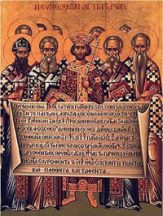After making the unsubtantiated as well as refutable claim that Jesus never existed (refuted here), Zeitgeist then repeats a very popular claim in the “Jesus Myth” crowd about the so-called Council of Nicea (or Nicaea),
It was the political establishment that sought to historize the Jesus figure for social control. By 325 a.d. in Rome, emperor Constantine convened the Council of Nicea. It was during this meeting that the politically motivated Christian Doctrines were established and thus began a long history of Christian bloodshed and spiritual fraud. And for the next 1600 years, the Vatican maintained a political stranglehold on all of Europe, leading to such joyous periods as the Dark Ages, along with enlightening events such as the Crusades, and the Inquisition.
 Zeitgeist claims that the Council of Nicea was was convened for two reasons: 1) for social control and 2) to establish the Christian doctrines. The problem with the first claim is that there is little or no evidence to support the charge that the council was for social control. — And as for the second claim, there were no doctrines established at the council of Nicea.
Zeitgeist claims that the Council of Nicea was was convened for two reasons: 1) for social control and 2) to establish the Christian doctrines. The problem with the first claim is that there is little or no evidence to support the charge that the council was for social control. — And as for the second claim, there were no doctrines established at the council of Nicea.
The Encyclopedia of the Orient says that the main purpose for the Council was the concern caused by the Heretic Arius who questioned the already Christian belief that Jesus was equal to God the father. He believed that Jesus was more than a man, but that he was created by God therefore making him inferior to the Father God, not quite human or divine.
The Catholic Encyclopedia points out that the vast majority of Bishops present at the council were believers in the equality of Jesus to the father so this particular doctrine was not “established” at the council as Zeitgeist would have us believe. More accurately, it was affirmed.
Other than dealing with the deity of Jesus Christ, there were other less important issues that were dealt with such as the establishment of Easter and the prohibition of self castration. — None of these are “doctrines,” but rather side-issues. So it turns out that the assertions that Zeitgeist makes are just more examples of “garbage in, garbage out.”
Next, Zeitgeist blames the Vatican for the “Dark Ages” and dates the start of that period from the year of the council of Nicea (325 AD) and claims it lasted for 1,600 years. — This claim shows how uninformed the film makers are. First of all, if the Dark Ages lasted for that long from 325 AD, then they would have ended in about 1925. Obviously this is not true.
The truth is the Dark Ages (or the Early Middle Ages) are actually dated from the 5th century to the late eleventh century, around 600 years . Zeitgeist is not even close. Also, contrary to the film’s claims, the Vatican cannot be blamed for the Dark Ages. — The History Channel points out that,
No one definitive event marks the end of antiquity and the beginning of the Middle Ages. Neither the sack of Rome by the Goths under Alaric I in 410 nor the deposition in 476 of Romulus Augustulus, the last Roman emperor in the West, impressed their contemporaries as epoch-making catastrophes.
It goes on to describe other causes such as the invasion of Rome by Germanic tribes, severe economic problems, and the 300 years of primitive culture in the European society. Christianity and the Vatican cannot be fully blamed for the Dark Ages, much less the Council of Nicea.
As for blaming Christianity itself for the Crusades, it should be emphasized that what happened then actually goes against Christian ethics. But a major and little known fact is that Christians do not deserve all (or even most) of the blame for the Crusades. — Thomas F. Madden, Associate Professor of History at Saint Louis University in his essay about the Crusades points out that there are a lot of misconceptions about what happened in the Crusades,
For starters, the Crusades to the East were in every way defensive wars. They were a direct response to Muslim aggression—an attempt to turn back or defend against Muslim conquests of Christian lands. Christians in the eleventh century were not paranoid fanatics. Muslims really were gunning for them.
Why doesn’t Zeitgeist mention this? Because it doesn’t fit with the film maker’s agenda to prove Christianity is evil. The fact is that neither Christianity or Catholicism can be completely blamed for the “Holy Crusades.” They certainly were innocent of the provocation, in the first place any way.
As for the Inquisition, it goes completely against Christian teaching. Jesus himself would never have condoned such a thing. There is no justification (or anything that can be construed as a justification) in the New Testament for the persecution of non-Christians and heretics. There is no question that the images of Jesus and the Cross have been abused in history, but that is no reason to judge Christianity in such a negative way.






0 comments:
Post a Comment